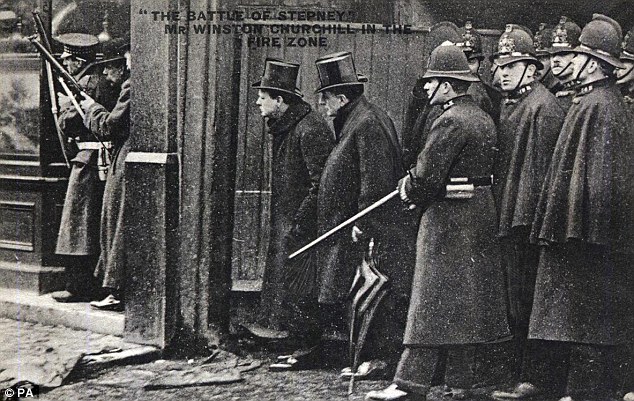Churchill

Author: Paul Johnson
Published: 2009 (168 pages)
Started reading: 8.August.2016
Finished reading: 11.August.2016

Churchill, front left, and then-Home Secretary, at the Sidney Street Siege
Brief description
Establishing causality in history is a fraught intellectual exercise, with so many variables to consider and the lurking question of the counterfactual. But in Churchill, Paul Johnson concludes that Churchill undeniably and single-handedly secured the Allied victory in World War II as few, perhaps none, of his parliamentary peers might have done.
Churchill’s rhetorical ability is well-known. (Apart from famous speeches, he contrived countless jokes and new phrases, including “punch above my weight” and “when it comes to the crunch”.)
One feature that sticks out as equally important in Johnson’s concise elegy is Churchill’s industriousness, his work ethic.
Johnson: “In his ninety years, Churchill had spent fifty-five years as a member of Parliament, thirty-one years as a minister, and nearly nine years as prime minister. He had been present at or fought in fifteen battles, and had been awarded fourteen campaign medals, some with multiple clasps. He had been a prominent figure in the First World War, and a dominant one in the Second. He had published nearly 10 million words, more than most professional writers in their lifetime, and painted over five hundred canvasses, more than most professional painters. He had reconstructed a stately home and created a splendid garden with its three lakes, which he had caused to be dug himself. He had built a cottage and a garden wall…
“He hunted big game and won a score of races. How many bottles of champagne he consumed is not recorded, but it may be close to twenty thousand. He had a large and much-loved family, and countless friends.”
Churchill was not only prolific but varied. In its diversity, his life almost literally embodies Robert Heinlein’s famous quote: “A human being should be able to change a diaper, plan an invasion, butcher a hog, conn a ship, design a building, write a sonnet, balance accounts, build a wall, set a bone, comfort the dying, take orders, give orders, cooperate, act alone, solve equations, analyze a new problem, pitch manure, program a computer, cook a tasty meal, fight efficiently, die gallantly. Specialization is for insects.”

A portrait of the artist as an old man: Churchill at his easel
At the end of his book, Johnson summarises the lessons we can draw from Churchill’s life. First, always aim high. Second, there is no substitute for hard work. Third, never allow mistakes, disaster, accidents, illnesses, unpopularity and criticism to get you down. Never waste time and emotional energy on recrimination, blame, malice, revenge and grudges. And finally, take joy in life.
I offer two specific, additional insights below.
Actionable insights
> Use otherwise idle time productively by learning. Fighting in India as a young officer, Churchill would devour books to fill gaps in his knowledge during the hottest part of the day, while everyone else were resting. During this time he read Gibbon’s history of Rome and Macaulay’s history of England, and Reade’s The Matyrdom of Man which likely turned him atheist. Modern examples of filling idle time with learning are reading during commutes and listening to podcasts on long drives.
> Leverage further value/career capital from exceptional personal experiences by writing about them and having those writings published. Until he was 26, Churchill pursued a deliberate strategy of accumulating wealth and building his name by writing for English newspapers about his experiences as an officer in far-flung campaigns. To take just one example, while in South Africa he reported the Boer War for the Morning Post, earning some cash and again getting his name in the media. Off of the back of this strategy Churchill was elected to the House of Commons in 1901, at 26 years of age.
